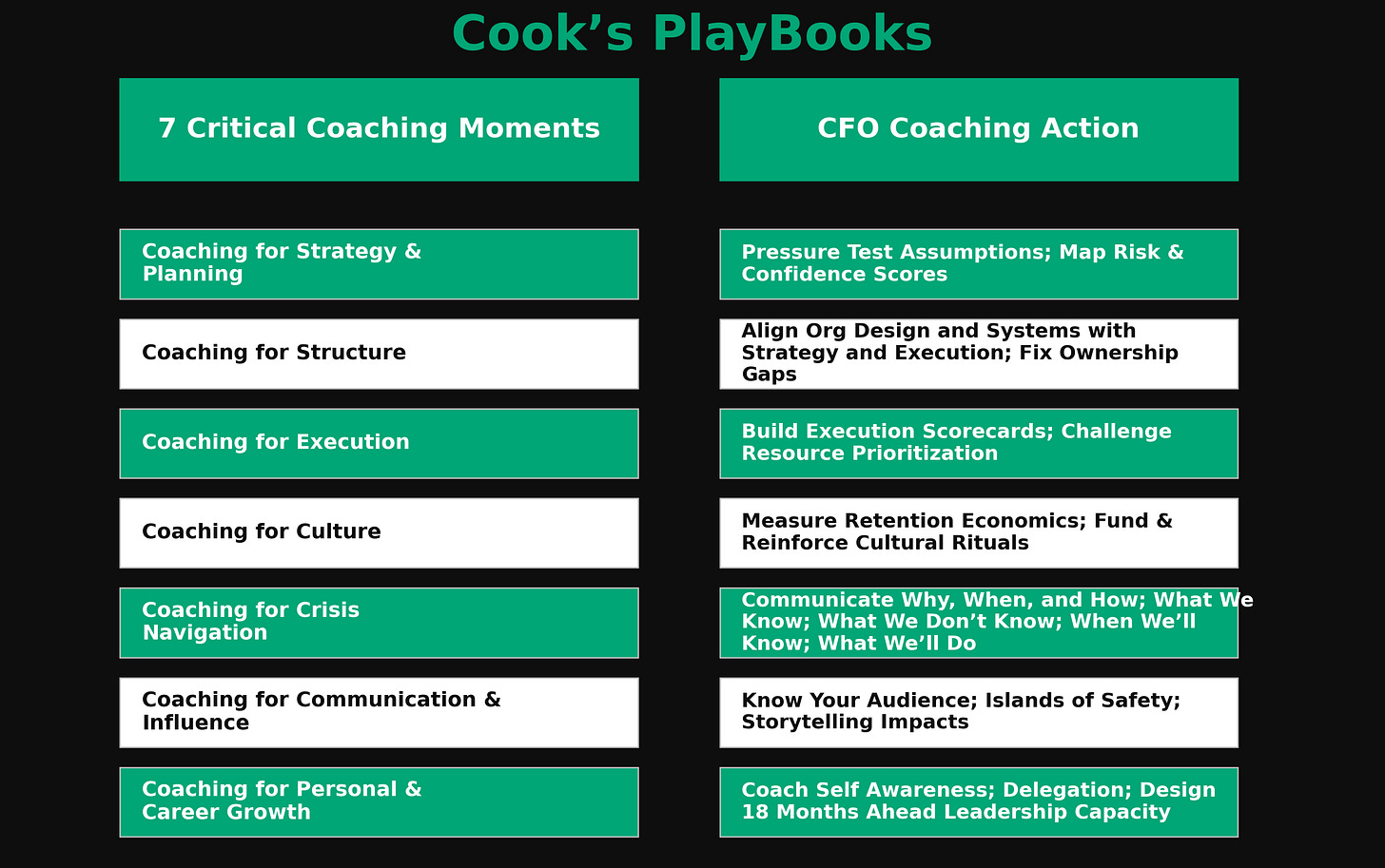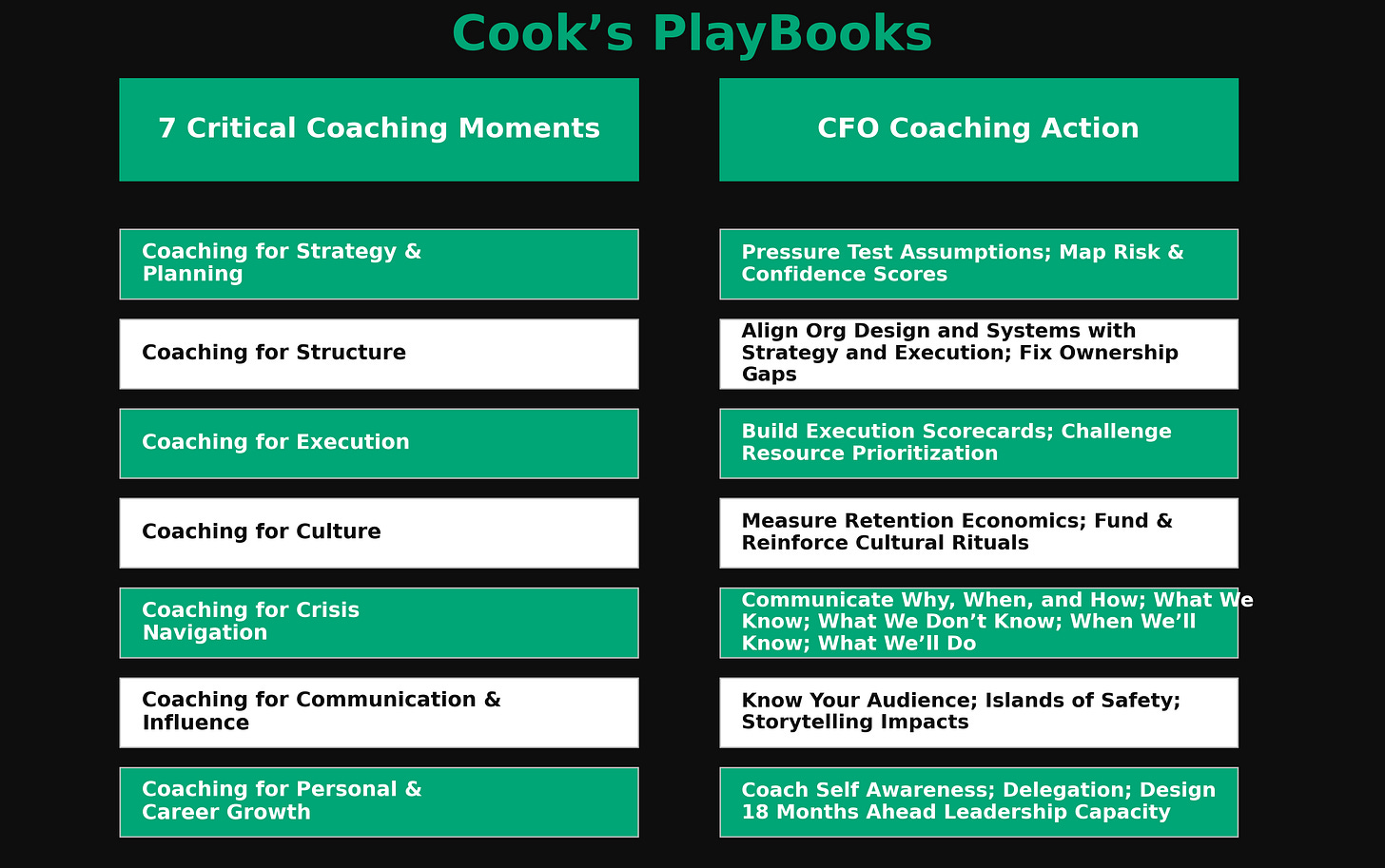7 Critical Coaching Moments
How and when you call those trusted voices in your network - your coach, mentor, your close colleagues
The best executives I’ve coached know there are specific moments when they call me, their mentor(s), and/or their close colleagues on critical issues. Learning to lean on these trusted outside voices as your “2nd brain” may be a new habit for you. I know it was for me. Many of us grew up in a family or culture where “asking for help” was the step only after “go figure it out by yourself” and “only ask for help after you’ve banged your head against the wall several times”.
I wish I would have personally learned this lesson earlier. There were many times then (and still today) where I needed to ask for help earlier before my head hurt. After getting better at this new “asking for help” habit, I’ve come to learn that many of these trusted voices and humans in general actually enjoy being needed and generally lean in hard when you ask for help.
Hint: If they don’t, they should likely be removed from your “trusted voices” list!
My bottom line for this post? The help is out there. All you have to do is to change your mindset and get in the habit of texting, emailing, or calling the trusted voices in your life.
In my executive coaching practice, I started writing down themes across my client base. Since 7 is a magic number I didn’t go any further for today’s post. Certainly there are more. Maybe I’ll compile more in a future post.
1. Coaching for Strategy and Planning
Starting with establishing and communicating strategy. Creating an operating roadmap, understanding true priorities and decision making tradeoffs.
A coach, mentor, or your trusted colleagues can help you:
Pressure-test assumptions.
Surface the hidden ones. Help you look down the road 3 steps ahead.
Map tradeoffs to a clear decision framework.
Decide what not to do this quarter.
Communicate the Why, When, and How.
Call your coach; mentor-advisor; trusted voices when:
You’re heading into your quarterly business review, your strategy review, or your annual operating plan process.
You experience a concerning market shift, competitive threat, or a 2nd brain on the funding climate.
Your CEO or Board is having their own issues with setting strategy and need your trusted voice in the room but you are unclear how to a) ensure you get in that room and b) how to influence the room once you get in it.
2. Coaching for Structure (Org Design and Systems)
Structure is the bridge between strategy and execution. Hiring the right people and implementing the right systems at the right time and company size/scale is critical for success. Get that timing wrong or putting the wrong players in the wrong positions at the wrong time is a recipe for expensive failures - much more than a coach would ever cost you.
A great coach and/or your trusted voices can help you:
Align org charts and systems with current strategy and situational analysis.
Help provide their own context and experience with challenging your assumptions on required role capabilities and required role behaviors.
Role play with you on communicating and properly delegating ownership and the “change leadership” required for restructuring the org.
Call your coach and trusted voices when:
You’re making a major re-org or pre-acquisition structural planning or post-acquisition integration.
Your systems can’t keep pace with your growth and required scaling.
Your leaders are working around your company structures and systems instead of working together through it.
3. Coaching Your Team(s) for Execution
Execution isn’t about micromanaging the work/plan. It’s more about architecting the operating machine to get the work done with the proper feedback and continuous improvement loops.
Your coach and/or trusted voices help you:
Diagnose executional blocker or slowdowns due to lack of clarity, accountability, or proper ownership.
Shift from reactive firefighting to proactive rhythms, rigors, and leadership.
Designing decision making systems and ownership accountability.
Call your coach when:
Deadlines are slipping without clear root causes.
You’ve inherited a team and need to design a new set of execution rhythms and rigors.
You are drowning in firefighting work, status meetings, and not able to critically think and lead strategically.
4. Coaching for Culture
Culture is what your people do when no one’s watching. Culture is what your team and company believe leadership truly values and acts upon.
A coach helps you:
Diagnose, Design and Communicate the proper behaviors that are the foundation of the team and company values you want.
Establish effective interviewing, hiring, and onboarding techniques to screen for fit and performance.
Make sure you retain A-players and identify high-potential talent.
Call your coach when:
You’re scaling headcount rapidly.
Your CultureAmp or Lattice Engagement Scores drop or team/company attrition rises.
Old guard and new hires are clashing.
5. Coaching for Crisis Navigation
When the shit hits the fan and your current operating playbooks go out the window, you need someone who’s been there, done that:
This coach or mentor or trusted voice can guide you and remind you to:
Keep calm under the pressure.
Help you communicate clarity and next step decisions.
Run the “What We Know; What We Don’t Know; and When We Will Know” playbook.
Establish daily stand-ups to create clear prioritization to cut out the noise, fear, uncertainty, and doubt (FUD).
A neutral read on the crisis situation.
Definitely call your coach/trusted advisors when:
You face an unexpected operational failure.
Funding or revenue is under sudden threat.
A public, legal, or reputational issue emerges.
6. Coaching for Communicating and Influencing for Impact
C-Level roles are influence roles. You are always selling vision, confidence and impact.
A coach can:
Refine high-stakes messaging (Board, all-hands, fundraising).
Teach influence strategies without formal authority.
Prepare you for conversations you can’t delegate.
Call your coach when:
You’re rallying the company behind a major shift.
You need Board alignment on a controversial path.
You’re struggling to connect with a key audience.
7. Coaching for Personal and Career Growth
You can’t scale your company faster than you scale yourself.
A great coach can help you:
Identify blind spots you can’t see alone.
Create your career scorecard built for your personal/career goals, capabilities, and behaviors required.
Navigate and execute role transitions for either leveling up and/or leveling-out to a more healthy career environment.
Call your coach when:
You’re stepping into a bigger role or new C-Suite seat.
It’s time to get serious about leveling up and want that person that will help keep you accountable to your aspirations.
You want to define the next 2-3 years your leadership career vs just focusing on just the next quarter.
Did I Miss a Coaching Theme You Were Expecting?
Hit that Comment button or reach out to the subscriber chat and let’s continue the conversation.
Final Coaching Moments Insights
You may not need a coach every week but I’ve found that touching base with one at a minimum of every 2 weeks forms a new rhythm and rigor habit for you and helps your coach or trusted voices be more consistently “inside your head”…..knowledgable and up-to-date of your ever-changing company and team issues.
A great coach won’t give you all the answers but the best one’s will shift your mindsets, provide key frameworks and insights, and help you develop the playbooks for next step leadership. Many times they will simply be the mirror you need and help you find the keys to unlock your capability or behavioral blockers.
The next time you’re stuck or staring at a complex decision with high risk causing you to 2nd guess yourself or lose some sleep… take a deep breath and realize there are people you can and should call for help.
Send that text or email. Dial that number. Your trusted network voices are waiting for your call and the best ones will prioritize you over even themselves.
Here’s the visual/chart I created again…it looks quite good in my opinion! :)






